Resources
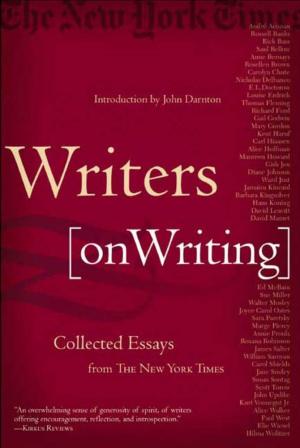
By turns poignant, hilarious, and practical, Writers on Writing brings together more than forty of contemporary literature's finest voices. Pieces range from reflections on the daily craft of writing to the intersection of art's and life's consequential moments. Authors discuss what impels them to write: creating a sense of control in a turbulent universe; bearing witness to events that would otherwise be lost in history or within the writer's soul; recapturing a fragment of time. Others praise mentors and lessons, whether from the classroom, daily circumstances, or the pages of a favorite writer. For anyone interested in the art and rewards of writing, Writers on Writing offers an uncommon and revealing view of a writer's world. Contributors include Russell Banks, Saul Bellow, E. L. Doctorow, Richard Ford, Kent Haruf, Carl Hiaasen, Alice Hoffman, Jamaica Kincaid, Barbara Kingsolver, Sue Miller, Walter Mosley, Joyce Carol Oates, Annie Proulx, Carol Shields, Jane Smiley, Susan Sontag, John Updike, Kurt Vonnegut Jr., Alice Walker, and Elie Wiesel. (From the Publisher)
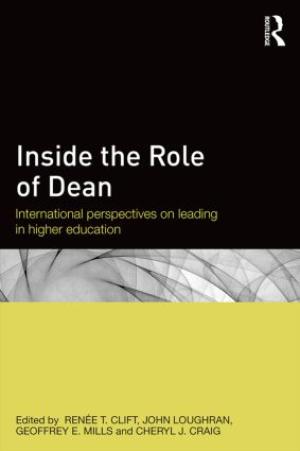
Despite deans playing critical roles in education, little is known about the knowledge, skills, and dispositions needed for the job, or the practical dilemmas they face on an almost daily basis. Each chapter of this international collection opens the role up for examination and critique, developing a deeper understanding of what it means to be a dean, and offering insights into the transition into the role, managing the daily demands and expectations of it, and what it means to exit the deanship. The book brings being a dean and the leadership inherent in the position into sharp focus based on international perspectives on doing the job.
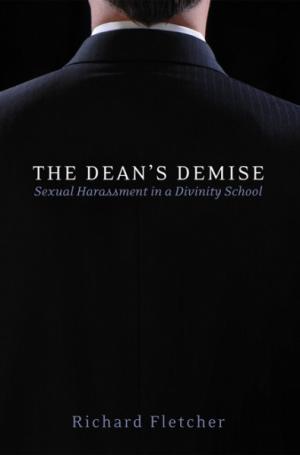
Click Here for Book Review Not everyone is surprised at the rumor suggesting that Karl Wolfe, Dean of The University School, recently told Rebecca Swingle, new professor at the school, that a promotion could be more easily attained were she to sleep with him. Certainly those least surprised were several female students who had been the target of the Dean's amorous behavior. But the question remains--who might stand and suggest that such behavior should not occur in a divinity school, of all places? The Dean's Demise offers readers a fictional case study in how something like sexual harassment impacts a divinity school's educational vision, its theological understanding of community, and the practical issues of governance.
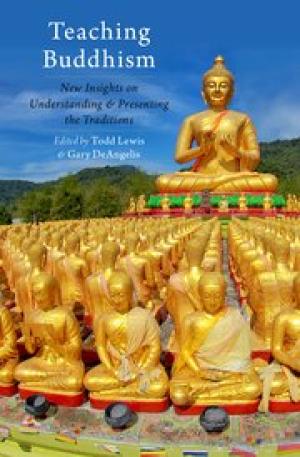
Click Here for Book Review Buddhist studies is a rapidly changing field of research, constantly transforming and adapting to new scholarship. This creates a problem for instructors, both in a university setting and in monastic schools, as they try to develop a curriculum based on a body of scholarship that continually shifts in focus and expands to new areas. Teaching Buddhism establishes a dialogue between the community of instructors of Buddhism and leading scholars in the field who are updating, revising, and correcting earlier understandings of Buddhist traditions. Each chapter presents new ideas within a particular theme of Buddhist studies and explores how courses can be enhanced with these insights. Contributors in the first section focus on the typical approaches, figures, and traditions in undergraduate courses, such as the role of philosophy in Buddhism, Nagarjuna, Yogacara Buddhism, tantric traditions, and Zen Buddhism. They describe the impact of recent developments-like new studies in the cognitive sciences-on scholarship in those areas. Part Two examines how political engagement and ritual practice have shaped the tradition throughout its history. Focus then shifts to the issues facing instructors of Buddhism-dilemmas for the scholar-practitioner in the academic and monastic classroom, the tradition's possible roles in teaching feminism and diversity, and how to present the tradition in the context of a world religions course. In the final section, contributors offer stories of their own experiences teaching, paying particular attention to the ways in which American culture has impacted them. They discuss the development of courses on American Buddhism; using course material on the family and children; the history and trajectory of a Buddhist-Christian dialog; and Buddhist bioethics, environmentalism, economic development, and social justice. In synthesizing this vast and varied body of research, the contributors in this volume have provided an invaluable service to the field (From the Publisher)
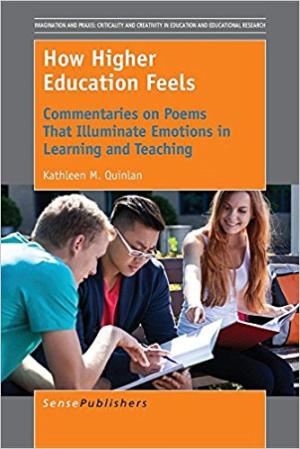
Click Here for Book Review Teaching and learning in higher education can evoke strong feelings, including confusion, anxiety, boredom, curiosity, surprise and exhilaration. These emotions affect students’ learning, progress and overall success. Teachers’ emotions affect how they teach and their relationships and communication with students. Yet the emotional dimensions of teachers’ and students’ experiences are rarely discussed in the context of improving higher education. This book addresses that gap, offering short, evocative case studies to spark conversation among university teachers. It challenges readers to reflect on how higher education feels, to explore the emotional landscape of courses and programmes they create and consider the emotional effects of messages embedded in various policies and practices. Following the student lifecycle from enrollment to reunion, each of the main chapters contains 10 to 15 accessible, emotionally-engaging poems that serve as succinct case studies highlighting how some aspect of learning, teaching or development in higher education feels. Each chapter also contains an expert scholarly commentary that identifies emergent themes across the cases and establishes connections to theory and practice in higher education. The poems-as-case-studies are ideal for use in faculty or educational development workshops or for individual reflection. A variety of theoretical perspectives and associated reflection prompts provide lenses for variously interpreting the poems. An appendix offers suggestions for structuring case discussions as part of educational development activities. The book promotes a person-centered discourse, giving voice to previously neglected aspects of higher education and reminding us that education is essentially a human endeavor. (From the Publisher)
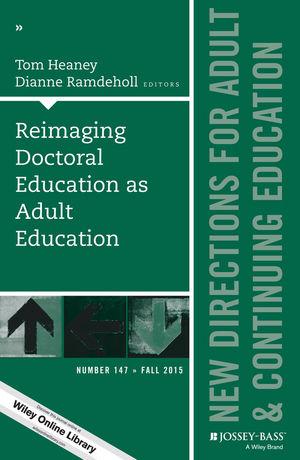
Click Here for Book Review This volume looks at graduate education, specifically the doctorate, through the lens of adult education practice. Students in doctoral programs are, after all, adults. Building on principles of adult learning, the authors provide examples of academic excellence achieved through the incorporation of best practices in adult education, including: - practical suggestions for democratically negotiating the curriculum - best practices for nurturing responsible action for social justice, - ways of encouraging collaborative and noncompetitive learning and research, and - support in shifting paradigmatic assumptions beyond the Eurocentric frame. This is the 147th volume of the Jossey Bass series New Directions for Adult and Continuing Education. Noted for its depth of coverage, it explores issues of common interest to instructors, administrators, counselors, and policymakers in a broad range of education settings, such as colleges and universities, extension programs, businesses, libraries, and museums. (From the Publisher)
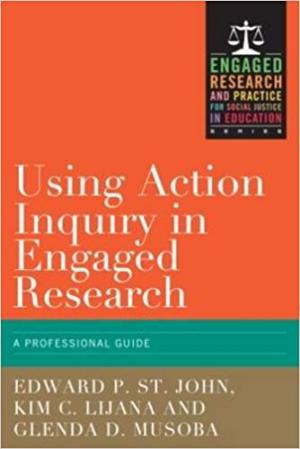
Click Here for Book Review Using Action Inquiry in Engaged Research: A Professional Guide offers higher education and school professionals practical guidance and methods for using the Action Inquiry Model (AIM) in engaged research initiatives and community partnerships. Replete with group exercises and case studies, this guide was originally developed to supplement workshops for faculty, administrators and students working on action initiatives that focused on critical educational issues facing local communities. It provides a useful framework and straightforward techniques for building empowering partnerships. The Action Inquiry Model (AIM) includes four stages: • Assessment: Using research and experience to identify critical challenges facing the university with respect to the improvement of educational opportunities • Organization: Developing workgroups to collaborate on initiatives that address critical challenges; providing financial support for new initiatives; and providing release time and professional development opportunities for faculty and staff who engage in reform initiatives • Action Initiatives: Treating reforms as pilot tests for new strategies, as a means of promoting organizational learning, professional development, and student success • Evaluation: Integrating the evaluation of current programs and incorporating new initiatives into the reform process. This guide provides two methods for learning the inquiry process: a step-by-step process for defining tasks for teams of researchers and practitioners working together to use research to inform the educational improvement; and sets of case studies on assessment and action inquiry to inform groups in collectively discussing problems and strategies, an approach that supports the classroom use of the Guide. The key tasks in action inquiry initiatives include: 1. Build an understanding of the challenge 2 Identify the causes of the challenge using data to test hypotheses 2. Look internally and externally for solutions 3. Assess possible solutions 4. Develop action plans 5. Implement pilot test, and evaluate This guide is appropriate for professional development programs and as a text for higher education Masters and Ph.D. programs. (From the Publisher)
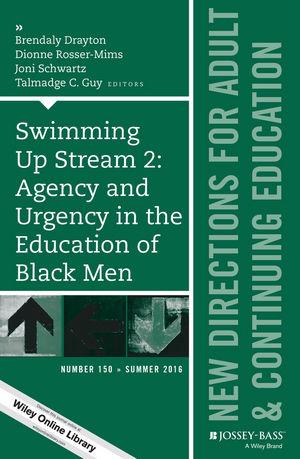
This volume is the continuation of a two-part series that focuses on salient topics and issues affecting Black males as they engage in adult education and learning. Considering the historical and current effects on the way these men participate in adult education, this volume broadens the conversations around adult Black males’ educational experiences by utilizing academic research as well as program descriptions and personal narratives with a concern for the “lived experiences.” More specifically, the authors explore: - the agency of Black men in carving out pathways to success - the programs that support these endeavors, and - the role of civil society in facilitating or inhibiting their progress. Topics covered include the digital divide, sports, professional career development, sexuality, role of religion, college as a choice, and the Black Lives Matter initiative. Practitioners will be encouraged to reflect on their own practices as they work toward engagement of Black males in learning communities. This is the 150th volume of the Jossey Bass series New Directions for Adult and Continuing Education. Noted for its depth of coverage, it explores issues of common interest to instructors, administrators, counselors, and policymakers in a broad range of education settings, such as colleges and universities, extension programs, businesses, libraries, and museums. (From the Publisher)
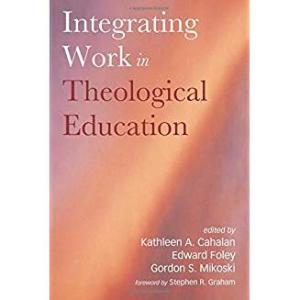
Click Here for Book Review If only we could do a better job of helping students at "connecting the dots," theological educators commonly lament. Integration, often proposed as a solution to the woes of professional education for ministry, would help students integrate knowledge, skills, spirituality, and integrity. When these remain disconnected, incompetence ensues, and the cost runs high for churches, denominations, and ministers themselves. However, we fail in thinking that integrating work is for students alone. It is a multifaceted, constructive process of learning that is contextual, reflective, and dialogical. It aims toward important ends--competent leaders who can guide Christian communities today. It entails rhythms, not stages, and dynamic movement, including disintegration. Integrating work is learning in motion, across domains, and among and between persons. It is social and communal, born of a life of learning together for faculty, staff, administrators and students. It is work that bridges the long-standing gaps between school, ministry practice, and life. It's a verb, not a noun. Here a diverse group of theological educators, through descriptive case studies, theological reflection, and theory building, offer a distinctive contribution to understanding integrating work and how best to achieve it across three domains: in community, curriculums, and courses. (From the Publisher)
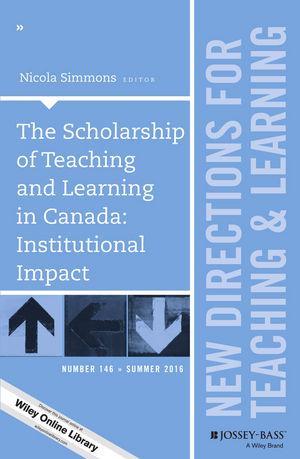
Develop effective models of practice and positively impact institutional teaching and learning quality. This volume provides examples and evidence of the ways in which post-secondary institutions in Canada have developed and sustained programs around the scholarship of teaching and learning (SoTL) that impact the institutional pedagogical climate. Topics include: - the historical development of SoTL in Canada, - institutional SoTL practices, including evidence of impact, - program design and case studies, and - continuing challenges with this work. This is the 146th volume of this Jossey-Bass higher education series. It offers a comprehensive range of ideas and techniques for improving college teaching based on the experience of seasoned instructors and the latest findings of educational and psychological researchers. (From the Publisher)